Gender and the Bible Collection (12 vols.)
Digital Logos Edition
Overview
Women play prominent roles in the biblical narrative. Stories of Eve, Sarah, Ruth, Esther, and countless other women are central to the message of the Bible. The women of Scripture raise important questions for modern readers. What do these stories reveal about women in Scripture? What do they reveal about their cultural context? What do they reveal about modern interpretations of Scripture?
This collection draws from a wide range of interdisciplinary scholarship to examine the relationship between gender and the Bible—from Old Testament scholars to critical theorists, from historians to sociologists. The 12-volume Gender and the Bible Collection is devoted to the stories of women in the Bible, as well as matters of interpretation and perspective. The authors examine the social and political roles of women in the Bible, the position in relation to Old Testament law, and prominent women in the biblical narrative, such as Esther and Ruth. The authors also tackle complicated interpretive matters, such as the history and influence of feminist interpretation. This collection contains essential material for pastors preaching on stories of women in Scripture, and for anyone interested in exploring complex matters of interpretation.
With the Logos Bible Software edition, all Scripture references are linked to the original language texts and the English Bible translations in your library. Logos also gives you access to the latest research tools—such as advanced search features, tagging, and linking. With Logos Bible Software, every word is essentially a link, and double-clicking any word—in any language—automatically opens your lexicons and search for a match. For pastors, scholars, and students of the Bible, Logos provides you with an essential tool for reading and researching the text of Scripture.

- Exegesis and commentary on key women in Scripture
- Survey of feminist interpretation
- All Scripture references linked to the Bibles in your library
- Title: Gender and the Bible Collection
- Publisher: T & T Clark International/Sheffield Academic Press
- Volumes: 12
- Pages: 2,884
This title is included in the following collections
You can save when you purchase this product as part of a collection.
Logos 8 Messianic Jewish Diamo...
$2,999.99$2,999.99Logos 9 Messianic Jewish Diamo...
$2,999.99$2,999.992025 Messianic Jewish Portfoli...
$4,749.99$3,562.49Library of Hebrew Bible/Old Te...
$4,999.99$4,999.99
- $23,999.99$17,999.99
- $24,999.99
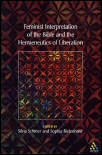
Since its origins in the women’s liberation movement, feminist exegesis has been subject not only to the demand to identify the oppressive functions of biblical texts but also to contribute to the liberation of women. What biblical texts can serve this process of liberation—for which women, under what conditions, and in what manner? What roles do categories such as woman, gender, liberation, freedom, Holy Scripture, church, and theology play?
This book originated from a symposium with feminist biblical experts from over twenty countries from five continents. It provides a striking and imaginative depiction of the questions central to feminist exegesis and the hermeneutics of liberation. It also provides a lively example of the kind of global discussion of the Bible and liberation that can take place among women from around the world. Typical of this discussion is the confrontation with questions such as contextuality or the diversity of feminist biblical interpretation (whether of theological or non-theological nature), and clear positions are taken with regard to issues such as the termination of anti-Judaism in feminist biblical interpretation or the dangers of neo-colonial domination in feminist-theological studies.
Silvia Schroer is Professor of Old Testament and Related Studies in the Protestant Theology department at the University of Berne, Switzerland.
Sophia Bietenhard is Minister of the Reformed Church of Switzerland and lecturer in a teacher’s training institute, Berne, Switzerland.
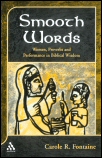
In this volume, Carole Fontaine explores the social roles of women as depicted within the book of Proverbs, as well as the character archetypes and patriarchal ideologies which undergird the sages’ portrayal. Using feminist folklore methodologies and performance studies, the author explores an alternative paradigm for understanding women’s relationship to wisdom traditions in the ancient Near East, using parallel texts, later midrash, and extra-biblical representations of biblical women associated with wisdom. Fontaine is thus able to show that women were culturally authorized “performers” of the family-based wisdom traditions of teaching, economic problem-solving, and care-giving, and that these roles provided them with a platform to use their acknowledged wisdom in public roles.
Carole Fontaine is Professor of Hebrew Scriptures, Andover Newton Theological School, Newton Center, Massachusetts.
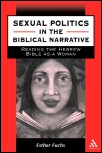
In this challenging collection of essays, Esther Fuchs focuses on type-scenes as a way of demonstrating the mechanisms by which the text validates male power and superiority. She also deconstructs biblical sexual politics by asking whose interest is being served by the good women of the Bible.
Esther Fuchs is Associate Professor, Program of Judaic Studies and Department of Near East Studies, University of Arizona.
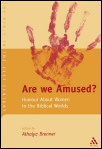
Biblical humor about women and gender remains elusive for many readers, for its recognition may imply the realization that it’s a cruel and disrespectful humor, ridicule rather than good-natured fun. But viewing humor as social critique, as is largely done in the essays in this volume, with respect to both the texts read and their actual or implied author, may be fun as well as significant for understanding the biblical world.
As most of the essays show, writing about women is writing about men as well. In other words, it is writing about gender roles. The critique of women serves as a critique of men, manhood, and maleness in the texts, of the text’s authors, and of the texts’ commentators and readers.
Contributions to this volume include:
- Those Riotous—Yet Righteous—Foremothers of Jesus: Exploring Matthew’s Comic Genealogy, F. Scott Spencer
- "More Righteous Than I": The Comeuppance of the Trickster in Genesis 38, Mary E. Shields
- Humor, Turnabouts, and Survival in the Book of Esther, Kathleen M. O’Connor
- Is that Fearfully Funny? Some Instances from the Apocryphal/Deuterocanonical Books, Toni Craven
- At the Expense of Women: Humor in Acts 16.14–40, Kathy Williams
- Are We Amused? Small and Big Differences in Josephus’ Re-Presentations of Biblical Female Figures in the Jewish Antiquities 1–8, Athalya Brenner
- Ooooh, Onan! Geschlechtgeschicte and Women in the Biblical World, Gale A. Yee
- Women’s Humor and Other Creative Juices, Amy-Jill Levine
- Laugh With/At/As Women: How Should We Read Biblical Humor?, Esther Fuchs
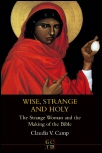
The relationship of the Strange Woman and Woman Wisdom, separate but inseparable in Proverbs 1–9, is the book’s analytical starting point, becoming a hermeneutical lens for viewing other texts of strangeness of gender, ethnicity, sexuality, and cultic activity. Wisdom and strangeness mark the narratives of Samson and Solomon, while priestly literature sets strangeness against holiness. Miriam and Dinah, sisters of cultic eponyms Aaron and Levi, are Israelite women defiles or unclean, made strange. Priestly and wisdom constructions of gendered strangeness intersect, illuminating the ideologies of identity that develop in the post-exilic period and shape the beginnings of the biblical canon.
Claudia V. Camp is Professor of Religion at Texas Christian University.
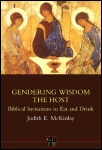
Wisdom is a prominent theme of much of Scripture—perhaps most vividly in Proverbs, but also in Apocryphal and New Testament writings. Gendering Wisdom the Host examines the role of women in wisdom literature, and the feminine Wisdom in particular. McKinlay provides a close reading of Proverbs, Ben Sira, and the Gospel of John to help explain the gendered norms of the text—both in the text itself and in the assumptions of listeners and readers of the text. She also explores the extent to which a gendered understanding of Wisdom affects exegesis and interpretation.
Judith E. MicKinlay is Professor of Old Testament at the University of Otago in New Zealand. She is also the author of Reframing Her: Biblical Women in Post-Colonial Focus.
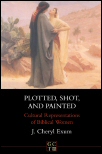
What many people know of the Bible often comes from popular representations of biblical texts, rather than from studying the Bible itself. How are biblical stories altered through paintings, film, literature, and other forms of popular culture? How do cultural interpretations of women in the Bible affect how we read the story?
In Plotted, Shot, and Painted, J. Cheryl Exum explores the history and state of feminist interpretation of Scripture through the lens of popular culture. She discusses gender bias not only in cultural representation, but also in biblical interpretation and cultural portrayals of women. This fascinating book pursues new ways of understanding feminist biblical interpretation. It extends the scope of inquiry beyond biblical criticism into the broader area of cultural criticism.
J. Cheryl Exum is Professor of Biblical Studies at the University of Sheffield and the author of Tragedy and Biblical Narrative: Arrows of the Almighty.
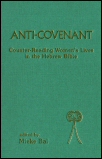
This volume examines the Bible as literature—as a book formative for Western culture not only as the revelation of God, but also as literature to be read and interpreted. Anti-Covenant: Counter-Reading Women’s Lives in the Hebrew Bible explores the interpretation of key texts about women in the Bible. Contributions to this volume include:
- The Legacy of Abraham, Carol Delaney
- Anti-Covenant, Ann Marmesh
- Desire and Danger: The Drama of Betrayal, Betsy Meredith
- Deborah the Woman Warrior, Rachel C. Rasmussen
- Narrative Theory, Ideology, and Transformation in Judges 4, Stephen Hanselman
- Constructions of Woman in Readings of the Story of Deborah, Jane Shaw
- Tamar and the Limits of Patriarchy: Between Rape and Seduction, Fokkelien van Dijk-Hemmes
- An Ideology of Expendability: Virgin Daughter of Sacrifice, Anne Michele Tapp
- A Ritual Processed, Beth Gerstein
- Pseudo-Philo and the Transformation of Jephthah’s Daughter, Cynthia Baker
- Between Alter and Wondering Rock: Toward a Feminist Philology, Mieke Bal
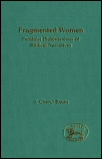
Drawing on contemporary feminist literary theory, this book constructs versions of women’s stories from the submerged strains of their voices in men’s stories. Among the biblical women represented are Sarah, Rebekah, Rachel, and Leah. Jephthah’s daughter, Samson’s mother, Samson’s Timnite wife, Delilah, the Levite’s wife, Michal, and Bathsheba.
J. Cheryl Exum is Professor of Biblical Studies at the University of Sheffield and the author of Tragedy and Biblical Narrative: Arrows of the Almighty.
J. Cheryl Exum is Professor of Biblical Studies at the University of Sheffield and the author of Tragedy and Biblical Narrative: Arrows of the Almighty.
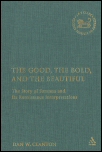
The story of Susanna and the Elders is one of the most interpreted and reproduced tales from the Apocrypha, and for good reason. In its compact narrative, it touches on attempted rape, female sexuality, abuse of power, punishment for the wicked, and voyeurism. The Good, the Bold, the Beautiful argues that the story of Susanna was written in the first century BC, and Clanton provides a brief description of that century. He performs a narrative-rhetorical reading of Susanna and illustrates that the story uses sexual anxiety and desire to set up a moral dilemma for Susanna. That moral dilemma is resolved in two ways: Susanna’s refusals to allow herself to be raped, and Daniel’s intervention. Clanton argues that although the story has many mimetic features, it is the thematic function that is overriding, especially after Daniel’s appearance. Put another way, the story’s emphasis on Susanna, the Elders, and Daniel as “plausible people” is secondary to its stress on what those characters represent and the message it is relaying through those representations.
Clanton analyzes chronologically selected aesthetic interpretations of the story found in the Renaissance. He shows that the prevailing artistic interpretation during the Renaissance focused on the mimetic, sexual aspects of the story because it deals with issues of patronage, and sex/gender that were current at the time.
The Good, the Bold, the Beautiful argues that several Renaissance renderings provide counter readings that focus more on the value and themes in the story. These renderings provide models for readers to resist the sexually exploitative features of both the narrative and its interpretations. Clanton reflects on the need for the reader to resist potentially harmful interpretation, especially those that focus on the mimetic level of the story’s rhetoric.
Dan W. Clanton, Jr. is Assistant Professor of Religious Studies at Doane College in Crete, Nebraska.
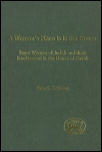
Archaeological discoveries have increasingly brought to light evidence of women’s involvement in the royal houses of the ancient Near East, yet such evidence has not fundamentally altered the perception of monarchy as an exclusively male-gendered theological, political, and social institution. Solvang’s study assembles the evidence in search of an integrated view of royal women’s position and power in critical functions of monarchy, challenging customary assumptions about women’s place in the royal harem. The historical information serves as a backdrop for a literary reading of biblical texts describing the royal house of Judah. Attention is given to three women representing different royal positions: Michal (daughter), Bathsheba (queen mother), and Athaliah (queen and monarch).
Elna Solvang is Assistant Professor of Religion at Concordia College, Moorhead.
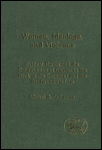
In Women, Ideology and Violence, Cheryl Anderson examines the laws relating to women that are found in the Book of the Covenant and the Deuteronomic law. She argues that the laws can be divided into those that treat women similarly to men (defined as “inclusive” laws) and those that treat women differently (“exclusive” laws). This study then suggests that the exclusive laws, which construct gender as male dominance/female subordination, do not just describe violence against women but constitute a form of violence against women. As a non-historical critique of ideology, critical theory is used to offer analytical insights that have significant implications for understanding gender constructions and violence in both ancient and contemporary settings.
Cheryl Anderson is Old Testament professor at Garrett-Evangelical Theological Seminary and a Methodist Minister. Previously she was a practicing attorney in Washington, D.C.